"Are You Lonesome To-Night?" (Part 2)
Blue Barron, Al Jolson, Elvis Presley, Sam Kinison & others: “The Part of a Broken Clown”
1950: Blue Barron & Al Jolson
During the postwar era, many earlier songs reappeared on the charts - famously Richard Whiting’s “Guilty,” which was famously revived by the composer’s singing star daughter, Margaret Whiting, as well as in an especially lovely Decca single by Ella Fitzgerald in 1947. Also in 1947, Dick Haymes and Dinah Shore both recorded the 1930 Walter Donaldson song “Little White Lies,” and it became a much bigger hit then than it had been the first time around. In fact, “Little White Lies” was even more popular in the UK, where it became a favorite of the young Paul McCartney and John Lennon, among many others.

In 1950, “Are You Lonesome Tonight” was revived by Blue Barron and his Orchestra. If you have never heard of Blue Barron (born Harry Freidman, 1913-2005) it’s no surprise. This is not one of the better-remembered ensembles of the Swing Era; in fact, it’s considered one of the least memorable, so-called “Mickey Mouse” bands of the period. Famously, Artie Shaw was tremendously insulted when some promoter compared his band to that of Blue Barron.
And yet, in this one instance, Blue Barron was a harbinger of the future, when he became the first artist in many years to revisit “Are You Lonesome Tonight?” The 1950 Blue Barron recording has the lyrics sung by a band crooner named Bobby Beers backed up by a female trio called The Blue Notes - a spin on the bandleader’s first name. They sing together over a celeste background, somewhat reminiscent of Sinatra and the Pied Pipers on Tommy Dorsey’s “I’ll Never Smile Again.”
Barron’s version of the song was released by MGM Records in March 1950, and there’s another credit on the label, “Narration - John McCormick.” McCormick reads the recitation rather drily, like a radio announcer doing a commercial for spark plugs or soap. Barron seems to be the first to realize that it was the recitation that made the song special, something more than just another archaic lament of lost love in ¾ time. What’s more, someone - either McCormick or the arranger - decided that the full monologue was too much, so it has been slightly edited.
Other artists would follow Blue Barron’s example - except in the use of a separate voice to read the monologue, i.e., somebody other than the singer. But apart from that, the 1950 Blue Barron version is the literal template for everyone to perform the song ever since. Note that McCormick’s recitation starts with a new line, reiterating the title, not in the sheet music.
I wonder if you're lonesome tonight.
Someone said “The world’s a stage - and each must play a part.”
Fate had me play a lover - with you as my sweetheart.
Act number one was where we met - and I loved you at first glance.I thanked the author for that part - and for giving me the chance.You read your lines so cleverly - you never missed a cue.
I was the happiest person on earth- but then there came act two.
You seemed to change - you acted strange - but why? - I’ve never known.
Then came the day you went away - and left me all alone.If you lied when you said you loved me - I had no cause to doubt you.
For I’d rather go one hearing your lies - than to go on living without you.
The stage is bare - and I’m standing there - in the part of a broken clown.
And if you don’t want to come back to me - they can ring the curtain down.
Al Jolson followed suit with a beautiful version on Decca a few months after Barron, in April 1950, and was greatly enhanced by a sumptuous orchestration by Gordon Jenkins that included a full mixed choir. Jolson and Jenkins follow the general template of the Blue Barron record, but with one important difference in that Jolson performs both the lyrics and the spoken monologue himself. That Jolson recites the same edited version of the recitation as McCormick indicates that he clearly used the Barron disc as a starting point. (Note that the British sheet music pictured below states incorrectly that this was the last record Jolson made. It was near the end, but it wasn’t the last.)
A few artists recorded “Lonesome” in the 1950s, including deep-voiced former band baritone Don Cornell - who cut his version, apparently, in between those of Barron and Jolson. The most rock-ish/doo-wop-pish interpretation would have to be by Jaye P. Morgan (later of The Gong Show fame) who sang it with twangy electric guitars and 16th-note triplets. In fact, Morgan’s single is actually much more conventionally rockish than the hit Elvis version. Both Cornell and Morgan include only the main chorus, not the verses or the recitation.
1960: Elvis and The Colonel
The hit 1960 Elvis Presley recording is the stuff of legend - as I said previously, this is the primary reason more people know this song than nearly any other song from the late 1920s. Since nearly everybody knows this back story, I won’t go into it at length. After two years serving in the U.S. Army stationed in Germany, Presley returned to Graceland, his newish home in Memphis, on March 2, 1960. He made his first post-service recordings sessions for RCA on March 21 and 22. Then on April 3 and 4, again in Nashville, he enjoyed a massively successful session that resulted in three classics.
As the Elvis biographies tell us, “Are You Lonesome Tonight” was famously the only time a song was recommended to Presley by his manager, the infamous Colonel Tom Parker. As we know, Parker was a major figure in the music industry who had absolutely zero actual interest in music. The song was a favorite of the Colonel’s wife, Marie Mott, and they both knew it from Gene Austin. Austin had been one of the leading radio crooners of the early microphone era, and later in the 1940s he had briefly been one of Parker’s clients. Austin had never recorded “Are You Lonesome Tonight” but it’s entirely likely that the Parkers would have heard him sing it.
That Presley, the undisputed King of Rock n’ Roll, was trying to expand his purview beyond a narrow definition of pop music was indicated not only by these three standards - “Fever,” “It’s Now or Never (O Sole Mio),” and “Are You Lonesome Tonight?,” but by his remarkable TV appearance with Sinatra, Welcome Home Elvis, taped in late March and broadcast in May. (Alas, I only wish they had taped this Timex Special a month later, because then he surely would have sung “Are You Lonesome Tonight?,” on the program.)
Presley had a practice of using specific recordings he liked as templates for his own interpretations: his hit version of “Hound Dog” was based on Freddie Bell and the Bellboys, rather than the original by Big Mama Thornton; “Fever” was based on Peggy Lee - using her special-material lyrics - instead of the original by Little Willie John; “It’s Now or Never” was Presley’s take on Tony Martin’s “There’s No Tomorrow” - albeit with all new lyrics - rather than the actual traditional Neapolitan song itself.
Presley’s “Are You Lonesome Tonight” is based directly on the Jolson recording, itself inspired by the Blue Barron, although he pared it down and made it more minimal - and perhaps also more intense. Instead of Gordon Jenkins’s lush orchestration, we hear only an acoustic guitar (Hank Garland) and bass (Bob Moore) - supposedly there are drums (D.J. Fontana), but they’re very faint - along with the Jordanaires (Gordon Stoker, Hoyt Hawkins, Neal Matthews, and Ray Walker) humming tonic notes subtly in the background. The story goes that to get into the mood, Presley had producer Steve Sholes turn out the lights in the studio, causing one of the back-up singers to bump into the mic on the first take, thereby necessitating a second take, which became the hit.
Other than the more intimate accompaniment, Presley only made one notable change from the Barron / Jolson versions: instead of describing himself as a “broken clown,” instead he says, “Now the stage is bare and I'm standing there - with emptiness all around.” Evidently enough was enough - he wasn’t happy with the “broken clown” line.
Although it was recorded in early April 1960, RCA didn’t release the song until late November, and then it became a massive hit - supposedly RCA had pressed over a million copies of the single even before the end of the year.
Here’s the original 1960 45 RPM single:
Presley seems to have genuinely loved the song, and continued to sing it for the remainder of his career. Among many live performances, he sings it on the 1968 “comeback” special - a very informal reading in which he essentially skips the recitation and instead sings a full second chorus of the refrain. There’s also at least one “laughing” version, where he sings the following in the bridge: “Do the chairs in your parlor seem empty and bare? / Do you gaze at your bald spot and wish you had hair?” And even after that, he’s in such a jovial mood that he pretty much laughs his way through the rest of the lyric. (There’s also a fine “straight” version from 1972.)
1961: The “Answer Songs”
The concept of the sequel song, as we might call it, goes back to the heyday of the blues. For instance, after Lovin’ Sam Theard and The State Street Swingers had a race records hit with “Rubbin’ That Darn Thing,” he followed suit with “New Rubbin’ on the Darn Old Thing.” (In fact, if you were to ever ask my late father what his favorite song was, he would usually answer “New Rubbin’ on the Darn Old Thing.”) Likewise, both Abe Lyman and his Californians, an early west coast hot dance band, and the pioneering Western swing band Bob Wills and his Texas Playboys recorded something that they titled “New St. Louis Blues.” And, as we’ve seen on this Substack, after the King Cole Trio topped the Harlem Hit Parade with “That Ain’t Right,” a singer named Perline Ellison responded with “New That Ain’t Right.” (Below, the original “Rubbin’ on the Darn Old Thing” followed by the sequel, “New Rubbin’ on the Darn Old Thing,” although granted, in this case, both are essentially the exact same song. PS: Honk if you want to hear Elvis singing “Rubbin’ on the Darn Old Thing!”)
By the early rock/doo-wop era, the sequel song had evolved into “The Answer Song.” (There’s a comprehensive entry on this concept in wiki - although it omits one of the goofier, earlier “answer songs,” “The Wedding of Lili Marlene,” sung by Sinatra and others.) My favorite example of an answer song is the Kitty Wells hit "It Wasn't God Who Made Honky Tonk Angels," which was a response to Hank Thompson’s "The Wild Side of Life"; this is a case when the answer song is more memorable than the original. When, in 1961, the young Burt Bacharach had an early hit with a song called “Tower of Strength” (sung by Gene Daniels) he followed it up with his own answer song, “You Don’t Have to Be a Tower of Strength” (sung by Gloria Lynn).
There were actually at least four “answer songs” to Presley’s blockbuster (thanks to David Arizmendi for bringing these to my attention). The most notable of these is by the veteran big band vocalist Thelma Carpenter (later famous as “Miss One” in the 1978 film of The Wiz); the others are by the younger pop singers Dodie Stephens, Jo Ann Perry, and Linda Lee. All of them borrow heavily from the Handman-Turk original, of course, but surprisingly, not from each other.
Just A Few Other Notable Versions:
Famously, Sinatra sang “Are You Lonesome Tonight?” as a minor key waltz ballad on his 1962 album All Alone, which he had originally intended to be titled Come Waltz With Me. The arranger here is Sinatra’s longtime occasional collaborator, Gordon Jenkins - the same man who did the classic arrangement for Jolson in 1950. Even though they are working with a huge string orchestra, this is a comparatively minimal and intimate performance; Sinatra’s singing here is as much to enhance the orchestra and the arrangement as it is to let them enhance him. There’s no choir, and Sinatra sings only the chorus - there is no verse and no recitation - simply and directly, letting the full power of the text, starkly minimal as it is, come forward. It’s an entirely different kind of a performance and arrangement than would be suitable for a more sophisticated song like “What is This Thing Called Love” or “Glad to Be Unhappy,” both on the 1955 In The Wee Small Hours.
Many rock icons, from Bryan Ferry to Boy George, have sung the song in a rough homage to Elvis, but I will only talk about two further, distinctly post-Presley treatments. First, here’s the remarkable Barb Jungr, from her 2005 Elvis songbook project, titled Love Me Tender. Her approach is not only post-Elvis but also postmodern and postnuclear. Instead of complicating the melody, she somehow makes it even simpler, stretching it out in a fashion that’s minimalist to the max, like the film scores of Carter Burwell, in which a single hanging note has great significance. (Ms. Jungr - who hasn’t appeared in New York in much too long - has long made a specialty of reinterpreting the songs of Bob Dylan - which I have written about enthusiastically - and you should also check out her great version of David Byrne’s “Once in a Lifetime.”)
And then we end with the amazing Sam Kinison (1953-1992), whose interpretation of the song - from The Tonight Show May 24, 1989 - works on multiple levels. (Andrew Lederer informs me that the three rather tall backup singers are Alan Stephan, Mitchell Walters, and Carl Labove.) While singing the song itself relatively straight, he replaces the traditional recitative with one of his highly outrageous standup comedy monologues - lots of screaming, reminiscent of his role in Rodney Dangerfield’s Back to School - it seemed outrageous then, and it’s still hysterically funny today. Johnny Carson: “Sam, you are deeply disturbed!” Less than three years later, Kinison, only 38, would be killed by a drunk driver.
Postscript: Andrew Poretz reminds me that in 1957, Presley recorded his version of The Ink Spots’ hit, “That’s When Your Heartaches Begin.” Like nearly every Ink Spots record, there’s a moment when basso Hoppy Jones talk-sings the lyrics, and Presley did the same in his version. This is an example of an artist electing to speak a lyric rather than a songwriter inserting a recitative that is meant to be spoken rather than sung - as on “Are You Lonesome Tonight?” Nonetheless, it is an early example of Elvis talking on one of his records. (And for even more fun, check out Andy Kaufman’s note-perfect imitation of Elvis singing “That’s When Your Heartaches Begin.”)
Special thanks to Elizabeth Zimmer, as always, not to mention Dan Weinstein, Robert Isaiah, Lawrence Schulman, and Michael Lavine.
Sing! Sing! Sing! : My tagline is, “Celebrating the great jazz - and jazz-adjacent - singers, as well as the composers, lyricists, arrangers, soloists, and sidemen, who help to make them great.”
A production of KSDS heard Saturdays at 10:00 AM Pacific; 1:00PM Eastern.
To listen to KSDS via the internet (current and recent shows are available for streaming.) click here.
The whole series is also listenable on Podbean.com; click here.
SING! SING! SING!
SSS 123 2024-11-23 The Harry Warren & Johnny Mercer Songbook, Part 1 - with Vanessa Racci & Robert Lamont
download: <or> play online
"Uncle Sam Blues - The Best of V-Discs"
(SSS #122 2024-11-16 )
Download <OR> Play Online
SLOUCHING TOWARDS BIRDLAND is a subStack newsletter by Will Friedwald. The best way to support my work is with a paid subscription, for which I am asking either $5 a month or $50 per year. Thank you for considering. (Thanks as always to Beth Naji & Arlen Schumer for special graphics.) Word up, peace out, go forth and sin no more! (And always remember: “A man is born, but he’s no good no how, without a song.”)
Note to friends: a lot of you respond to my SubStack posts here directly to me via eMail. It’s actually a lot more beneficial to me if you go to the SubStack web page and put your responses down as a “comment.” This helps me “drive traffic” and all that other social media stuff. If you look a tiny bit down from this text, you will see three buttons, one of which is “comment.” Just hit that one, hey. Thanks!
Slouching Towards Birdland (Will Friedwald's SubStack) is a reader-supported publication. To receive new posts and support my work, consider becoming a free or paid subscriber.



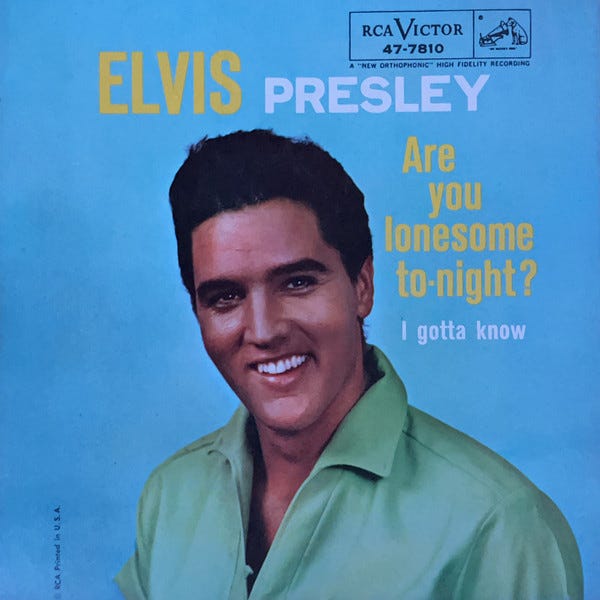
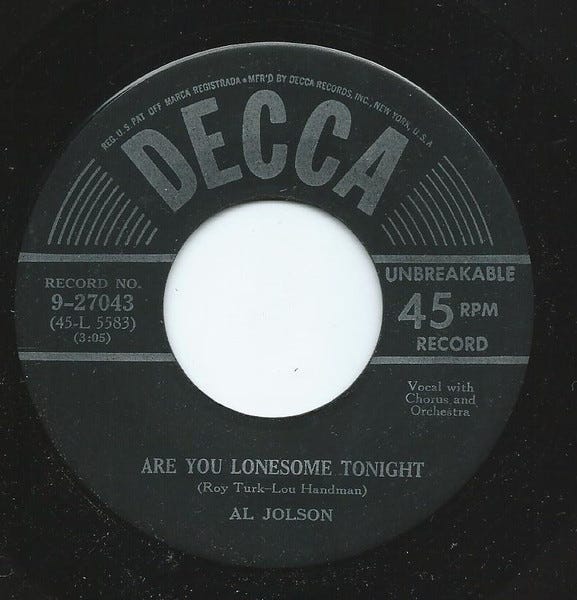
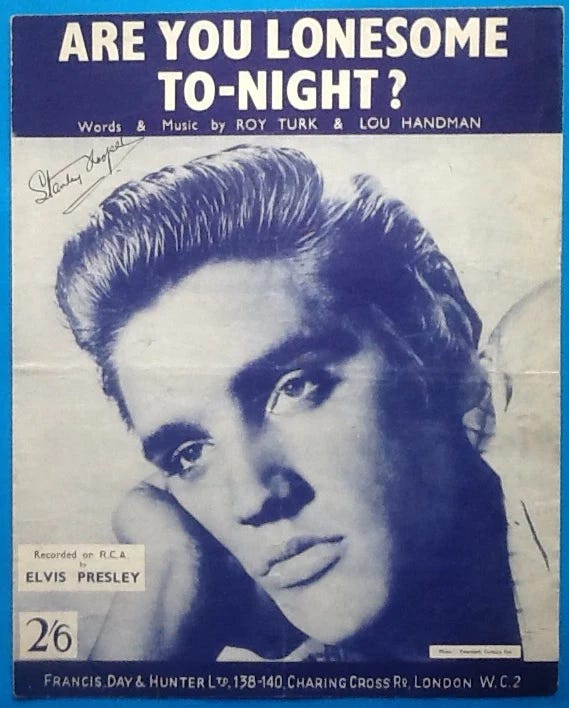
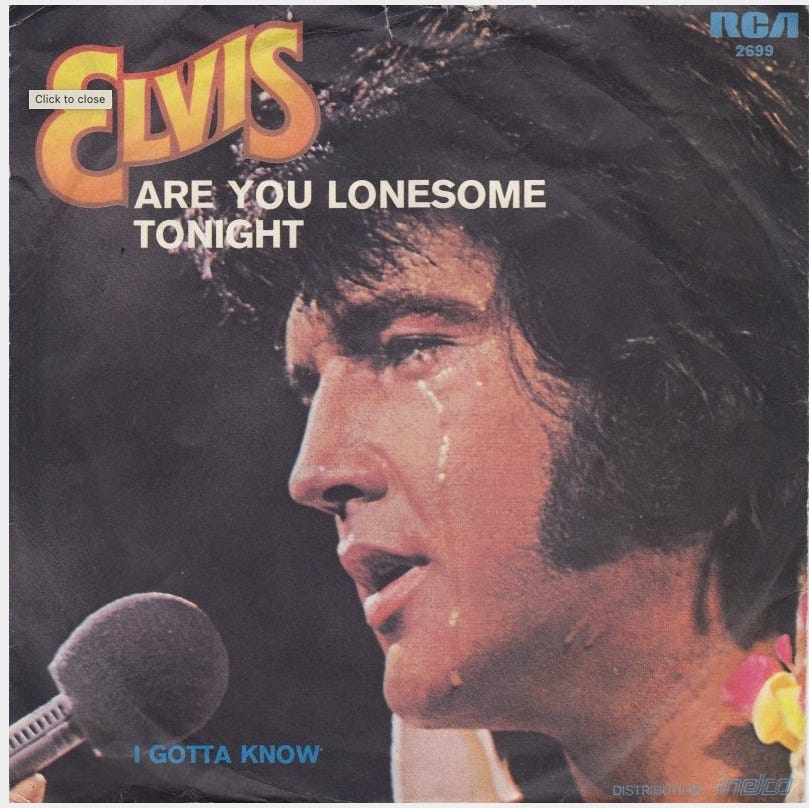
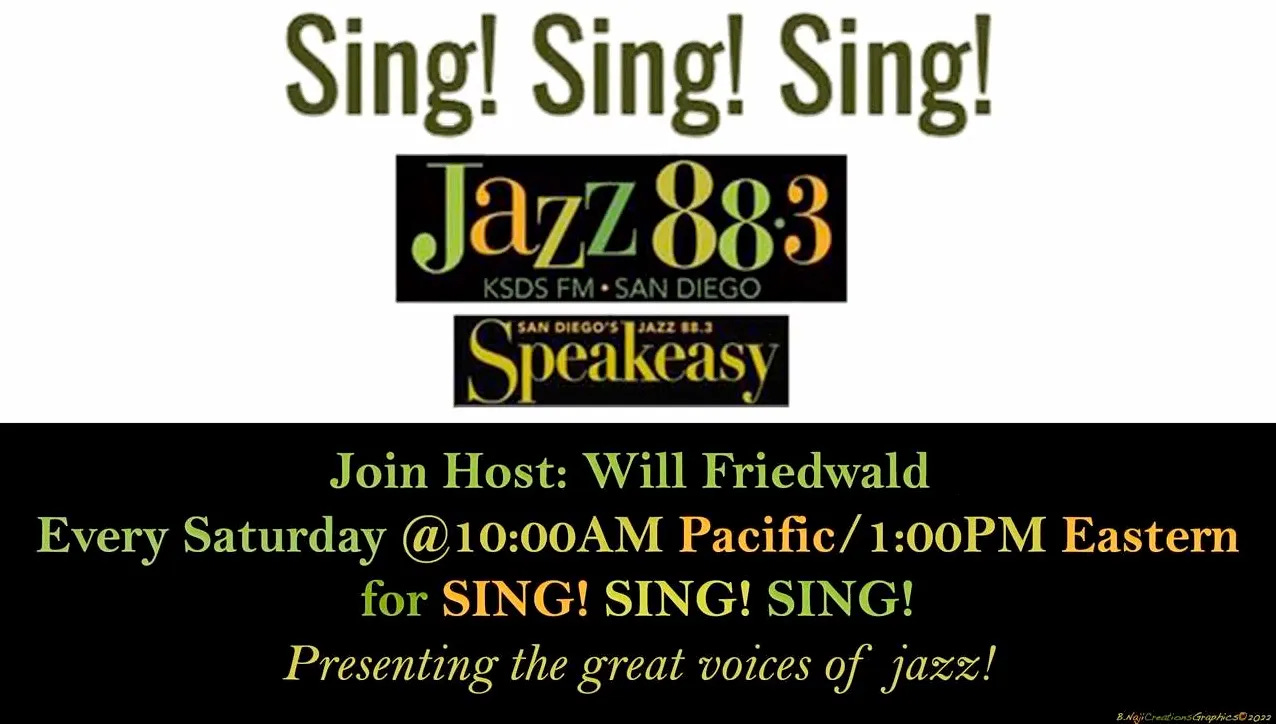
https://open.substack.com/pub/johnnogowski/p/there-was-only-one-king-elvis?r=7pf7u&utm_medium=ios